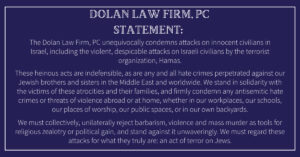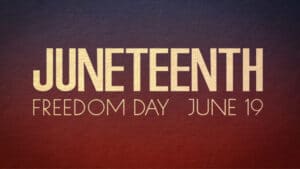
This week’s question comes from Zaid in Fremont: “Donald Trump denigrates and incites violence against Muslim Americans including threatening to make them all register. He speaks of nuking the Middle East. Trump even offered to pay the legal bills for anyone that attacks protestors at his rallies. Isn’t this hate speech? Is Trump responsible in any way when someone acts on his threats or statements and attacks a protester?”
Thank you Zaid for your timely and important questions.
I remember that not long after 9/11, then President George W. Bush sought to combat a spike in hate crimes against Muslim Americans by visiting a mosque and declaring, “America counts millions of Muslims amongst our citizens and Muslims make an incredibly valuable contribution to our country.” The President added, “And they need to be treated with respect. In our anger and emotion, our fellow Americans must treat each other with respect.”
How times have sadly changed. The two leading candidates for the Republican nomination for President have been dueling with each other to make the most extreme anti-Muslim comment.
Donald Trump and Ted Cruz have sought to capitalize on the revulsion we felt after the recent terrorist attacks and the widespread ignorance of Americans with Islamic history, religion and society to paint all Muslims as potential terrorists who must be targeted for increased police patrols and surveillance.
In his wholesale adoption of the agenda of anti-Muslim bigots, Donald Trump has uniquely contributed to the growing xenophobia against Muslims in America. Trump has called for “a total and complete shutdown of Muslims entering the United States,” along with expressing support for requiring Muslim-Americans to register with a government database and mandating that they carry special identification cards that note their faith.
Turning to your question Zaid, is this hate speech? My answer is no.
The First Amendment to the U.S. Constitution protects speech. Political speech, as compared to commercial or sexually explicit speech, is given the highest protection. The U.S. Supreme Court in its landmark 1964 decision of New York Times v. Sullivan explained that fundamental to the First Amendment is “the principle that debate on public issues should be uninhibited, robust, and wide open, and that it may well include vehement, caustic, and sometimes unpleasantly sharp attacks on government and public officials.”
But aren’t certain types of speech so lacking of value that they do not receive protection under the First Amendment? That is correct. Neither child pornography nor obscenity are protected. Certain “fighting words” also are not accorded protection. The classic example is the person who falsely shouts “fire” in a crowded theater. The First Amendment does not bar the individual’s prosecution for setting off a panic.
The “fighting words” exception to First Amendment protection, however, is narrow. The Supreme Court has stated, “Fighting words are not a means of exchanging views, rallying supporters, or registering a protest; they are directed against individuals to provoke violence or to inflict injury.”
For example, the Supreme Court reversed the conviction of a KKK leader for threatening “revengeance” if the purported “suppression” of the white race continued. Likewise, the Supreme Court reversed the conviction of a civil rights leader who organized a boycott of white-owned businesses for threatening to “break your damn neck” of any African-American that patronized the stores.
In both cases, the Supreme Court held that the constitutional guarantee of free speech encompasses rhetoric that advocates the use of force or violence. In both cases, the language was not followed by violence.
What if Donald Trump singled out a group of protestors to the crowd and encouraged members of the crowd to attack the protestors or offered to pay for the legal bills of anyone arrested for attacking the protestors? That would fall outside the bounds of protected speech. If through his comments Trump incited the crowd to violence, or ratified violence that broke out, Trump could be held liable.
Taking this scenario a step further, if the attacked protestors were dressed in traditional Islamic clothing or identified themselves through signs as Muslims, and Trump incited the crowd to attack this group knowing they were Muslims, a prosecutor would have strong evidence to bring criminal charges against Trump for violating the hate crime laws adopted in many states.
Zaid, while Trump’s crude and offensive language concerning Muslims at his political rallies may be protected under the First Amendment, his comments are deplorable and play upon the worst prejudices in our society.
I wholeheartedly agree with a statement issued by the Council on American-Islamic Relations, the nation’s largest Muslim civil rights group, earlier this year that Donald Trump’s “anti-Muslim rhetoric does not reflect leadership, but instead reflects a bigoted mindset that only serves to divide our nation and the world.”
By attorney Christopher B. Dolan, owner of the Dolan Law Firm. Email Chris questions and topics for future articles to help@dolanlawfirm.com









